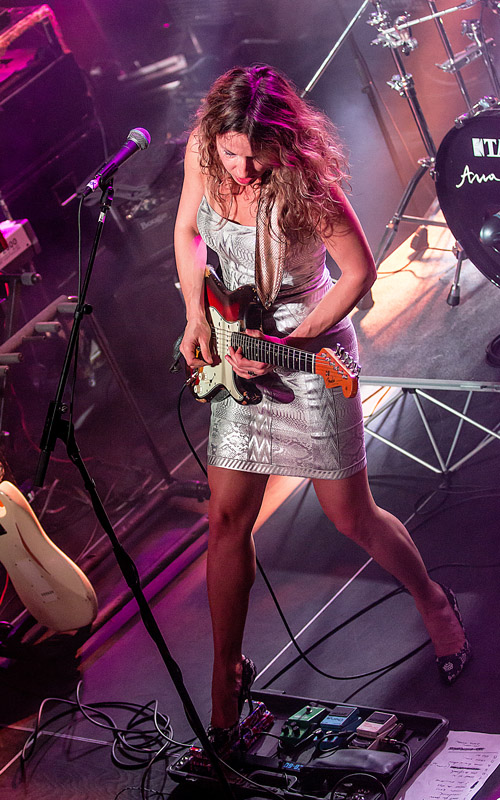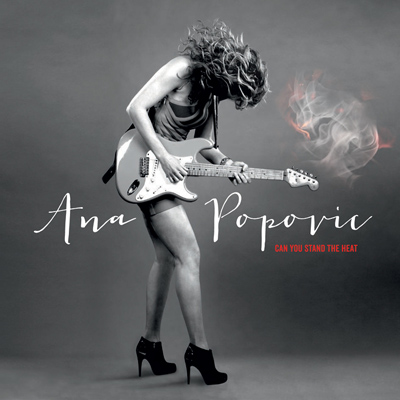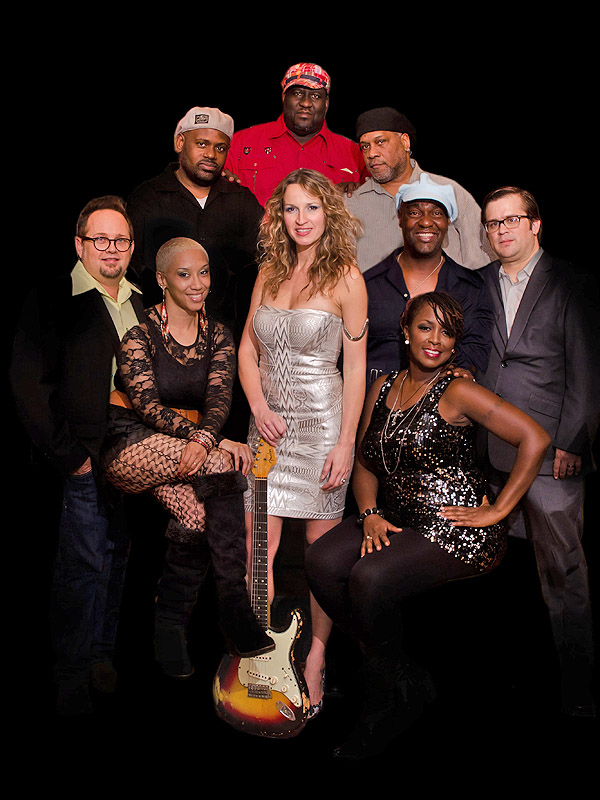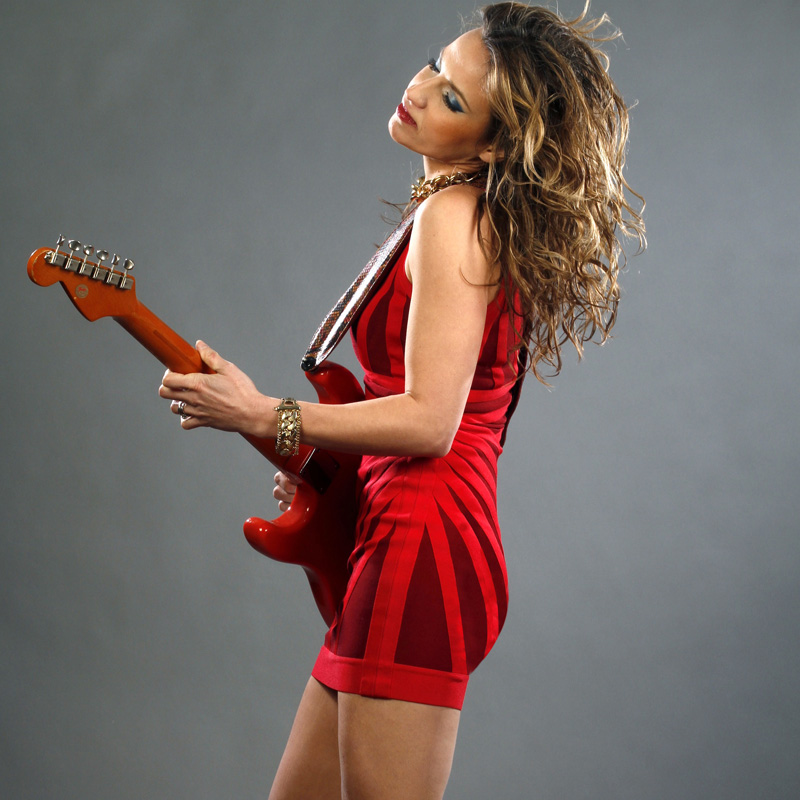ANA POPOVIC Interview
- Details
- Category: Interviews
- Published on Sunday, 29 December 2013 22:09
- Written by Richman

Tight grooves, soulful vocals, and tasteful blues licks: guitar slinger ANA POPOVIC is one of the world’s most remarkable contemporary female blues artists. Her latest record “Can You Stand The Heat” was one of the most outstanding Blues releases in 2013. GuitarMania interviewed the musician last year to learn more about the recording process for her latest album, why she moved to the United States, and the equipment Ana uses live and in the studio. Photo: Marco van Rooijen
Born in 1976 in Belgrade, ANA POPOVIC grew up in a warm and loving family where music was very important. All throughout her youth, her father would invite friends over for nightly jam sessions. In this atmosphere, she quickly learned her father’s impressive blues and soul record collection, grabbed his guitar and started playing at the age of fifteen. Since then, Ana has developed into an phenomenal guitarist/vocalist with a growing legion of fans throughout the world.
In December 2013, THE BLUES FOUNDATION nominated ANA POPOVIC, alongside BETH HART and SUSAN TEDESCHI, for the 'Contemporary Blues Female Artist' Award. And in Spring 2014, Ana will be performing at the EXPERIENCE HENDRIX TOUR together with BUDDY GUY, KENNY WAYNE SHEPHERD, ERIC JOHNSON, as well as many other stars of the genre.
Ana, can you please tell us how you got the band together and why you chose „Can you stand the Heat“ as a title for your latest album?
Well, you know, when I wrote the title song, I was playing with those amazing cats like Tony Coleman, who was B.B. KING’s drummer for more than two decades, and John William who was AL GREEN’s bass player. I made this record together with Tony and we talked about what kind of Blues he would like to put on, and what kind of Blues he thought he is missing nowadays on the Blues scene. And then he said “I am gonna get the band together for you”. We can sound really modern, but at the same time sound like ALBERT KING back in the days, or ALBERT COLLINS. You do not hear that kind of sounds anymore. That means that its got to have the groove. And its got to have this African-American kind of beat to it, because, the bottom line is, is that it is an African-American kind of music form. And nowadays we think that that is lacking, you know. So when you hear some music by ALBERT KING or ALBERT COLLINS, you could not stop shaking your head (or moving your feet).

Photo: Cheryl Gorski
So we thought “Where is the groove nowadays?” Nobody plays like these cats back in the days. For instance, if you want to take an example like “I Wanna Get Funky” by ALBERT KING: it is ‘just’ a blues record, but it has also has a very mainstream groove to it. Everything was so groovy, but at the same time it wasn’t a Funk record. They would just make Blues records. But it would be so funky, and yet so mainstream, that even when you hear them nowadays, even if you would publish it today, it would still be mainstream. So, to answer your question, me just thinking of playing with these cats, I thought I am gonna write a song about it that says “Can You Stand The Heat”. And I think everyone can feel the same. No matter what you are into. If you really want something, or whether you are not sure whether you are ready for something or not, and you want to show that you are ready for it - that is what the title song is all about. And it is about the groove. “Can You Stand The Heat” is about how fabulous these people play. And every song on this record has been recorded in one or two takes. Without much rehearsing. The recording was quite amazing, even when we recorded a slow shuffle, it got the right groove. So that is the reason why I thought “Can You Stand The Heat” is the right title for the record.
I understand. That would have actually also been my next question: How did you record? Was it basically a live recording in the studio?
Yes, definitely. The rhythm section, the rhythm guitar - that was my guitar in lot of songs - was done in just one take. In particular the instrumental parts. When I came to record that record - and that’s the funny part - I was seven and a half months pregnant with my daughter. So I flew at the very last moment to Memphis just to kind of put something on tape. So we were recording a shuffle, which was a very fast shuffle instrumental, and we recorded a take, which is sort of a jam of the band, you the kind of what WAR did (an American funk band from California from the Seventies). And I recorded those songs playing the guitar on the side because my belly was in the way. And I thought, it doesn't matter, because I wanted to replace those guitars at a later stage anyway. Just let me just play ‘something’. But in the end we really loved what we had. And that were just two takes of a shuffle. And I thought it was just perfect: the way we played, and the groove of the band. I don't think I could have repeated it that way. Maybe the licks would have been better, but I mean it is about these people playing so groovy and we just nailed it with one take. It was fabulous. So we decided to keep that live feeling on the records. Those people are just real pros and what ever they play is just perfect.

Were the songs already written by the time you came into the studio, or was there an improvisational element as well?
No, I mean I love doing records in two takes. When I went the first time into the studio in April, I recorded six tracks. I love going back home to get some distance and time in between so that I can think of what direction the record should go and what I am still missing. I definitely do not like to repeat songs, or to repeat styles. I want them to display a certain variety, while, at the same time I want them to fit, you know, to one story line of the song. So, to answer your question: yes, there were some songs that were ready, and some were made on the spot.
I am really very conscious of the drums. I am not somebody who thinks about bass a lot. I here drums all the time. Not necessarily bass guitar. I am really a drum purist. So it's really important to me how the drummer plays: if its on the beat, a little bit behind, ahead of the beat, that is very important to me. So we came up with ideas about the groove. We said we want this groove, that groove and then basically some songs just happened later on. We recorded a slow blues. We recorded seven takes of a slow Blues, and it took me a month to write the song and fit the lyrics to that slow Blues. I did not want to loose anything. I didn’t want to loose the slow part, I didn’t want to loose the high energy part, I wanted to fit the lyrics to the story just like ALBERT COLLINS used to do back in the day. He would just tell a story.
Which song is that?
It is called „Blues for Mrs Pauline“. So some songs were already ready like „Can you stand the heat“, while a lot of other songs took time to put together.
So „Blues for Mrs. Pauline“ is an example for spending a lot of time for writing and preparing the song?
Exactly, but concerning the groove and the band, usually all the songs on the record were played in only one or two takes.
 Photo: Sjoerd de Wit
Photo: Sjoerd de Wit
Let us talk about the equipment that you use. In your videos I saw you use Fender Stratocasters a lot.
Yes that's what I use. I use my original '64 Strat, and I got a reissue '57, those are my two main guitars. I also got a Custom Shop '60. And when it comes to amps, I use the most my MESA BOOGIE Mark IV. And then we use some Blackface FENDERs. We use the Super Reverb Blackface, and we use the original Bassman.
Do you use any overdrive pedals?
I use a Tube Screamer, it is an Ibanez original Tube Screamer from the early 70ies. That is basically it. I do not use any reissues. I use two of those. And then I use different channels on my Mark IV. Its got a medium distortion channel, the orange one, which I use the most. And that medium distortion has got a nice little modern boost to it, so sounds a little bit more modern and round than the FENDER would. And its got a really nice clean sound, which sounds exactly like the FENDER clean. I also use a VOX Wah-Wah pedal (note: the VOX Union Jack Wah pedal which has been discontinued by the manufacturer), which got a really nice tone to it and a nice loop, too. I prefer that one. They stopped producing those. I do not know why. Whenever I find one, I buy it, without trying it and I keep it. I also different reverbs in the studio. And I am also using the original BOSS chorus pedal, you know the one with just two knobs only (note: the Boss Chorus CE-2).
What strings do you use?
I use DR Strings and I use gauge 0.10.

Photo: Alain Hiot
Let us turn briefly to your career. It all began of course in Belgrade. Then you moved to Amsterdam to study, but then your career took off and you moved to the States. Is that correct?
That's correct. I had been studying for about three years: World Music, Pop and Jazz. And I stopped after three years because I wanted to make the American thing happening, no matter what. Even though the European festivals were going well, I was always pushing for America. Although a lot of promoters kept telling me to stay in Europe. The money was better here at that stage, but I always looked very hard to get something started in America. They had problems booking American bands and not European. I asked them to book me there, but they said we usually only book American bands, but they did make an exception for me. And I had been pushing that market very hard ever since. And then my studies were just in the way and I could never be there for any exams. And for obvious reasons, I would choose my gigs over any exams. So I was working hard on my career basically.
I was always going back and forth between Europe and the States because I wanted to keep both markets. And only the last four or five years I spent most of the time in the States. Last year (2012) I moved to Memphis, because of the recording and for the release of the record and stuff. And I will stay there for another year at least if not longer. But I also spend some time in Los Angeles and I spend some time in New Orleans as well. I like to inhale the city and I really like to experience it when I am recording versus just running from the tour bus to the studio and running back on tour. I kind of like to take time and enjoy the city.
Is your family always with you when you are going to Los Angeles or the other places?
Yes. Obviously the kids are still small so they can travel with us.
What are your Influences? Please tell us about the artists who inspired you when you were growing up.
I have been listening to Blues ever since I remember music. My father had a huge collection of blues records and I grew up listening to Elmore James, Sonny Landreth, B.B. King, Buddy Guy, Junior Wells, Stevie Ray Vaughan, ... you know, I like all different kind of blues, from Delta stuff to Chicago Blues, to Fusion Blues, to Rock Blues, to Funk Blues. All three Kings, Albert Collins, Jimi Hendrix, and later on Ronnie Earl, just about everything. I cannot really pick my favorite, because they are all so different.

So how did you develop your chops and learn your skills. Just by playing to the records or did you have a teacher?
Yes, I had some teachers, and learned some other stuff like Rock riffs or Jazz stuff, but Blues I learned actually from the records. And in particular Slide guitar I learned from the records because nobody could really play slide guitar back where I lived. So I use just a regular tuning and no open tuning, and that is how I learned playing Elmore James or Sonny Landreth or Roy Rodgers, those are my slide heroes. Or Ry Cooder and Johnny Winter those are my main influences.
And you are still using the standard tuning for slide?
Yes, that is correct. I tend to. I really try to find my own sound, I do not want to copy anybody. While there are a lot of disadvantages using standard tuning, one advantage it has is that you are creating your own sound and style. So I kind of kept that because I wanted to kind of explore that more. And I wanted to sound like I am ANA POPOVIC. That is one of the ways to do it. And it is very handy when you are playing shows. You don’t have to change guitars. You know, I am all for handy stuff.
You are doing a really great in job in writing modern blues songs. How do you do that? How do you approach your song writing, and what inspires you?
Well, it is a quest to write a modern blues song, but its still got to be Blues. I mean, you cannot just write a pop song. But you can write about subjects that could be just as well put in any pop song. That is the bottom line. Because back in the day, when they were writing about the cotton fields, and about taxes, and about I don't know what, that was the modern subject at that time, that was what was going on. They were not trying to write something about the 18th or 17th Century, they were writing about what was happening there. So I want to write about what is going on today. And it is a modern time and I am a modern women. You know, I want to inspire people, I want them to think about subjects. I want to be political – if I want to be political. And I want to approach everything in a ‘poppy way’, but then turn it into Blues, which is the most important thing.
I think it is very important to have a modern dictionary, to write about modern stuff, and to write about things you actually talk about. So to me it is not important to write about what the radio wants to play, or about another cliché and do the same thing over again. I mean you put out a hand full of records in a decade, so you might as well explore what is very important to you subject wise.

Photo: The Mo' Better Love Band
Then, put it out there and that is your meaning and that is something you could maybe inspire people or have them think about the subject, versus just singing „I woke up this morning feeling bad“, or „working on a cotton field“. It is very important to be different, I think. And that it is what I was trying to achieve. Obviously, because English is not my main language, it took me a lot of time. It started off a long time ago, when I was writing for my first American record. I would just use sentences that sounded nice and modern. And then it would go over „Still Making History“, which was a political record. Writing about my own experience, about the political stuff on the Balkan, in Serbia, and the Milosevic regime and student demonstrations and everything. That record really did something in America, because they found it was very personal. Everyone was asking me what is going on in Serbia. So I thought its time for me to just write stuff about it, as opposed to just trying to explain what was happening in every interview I did.
And then with „Blind For Love“, which was more personal because I got my first son, and I thought it was the most important thing in life to find time for family and actually not run from coast to coast. And find time for the people who really need you around. So that was the message on that record.
„Unconditional“ was a Blues record that I wanted to write in a really modern way. And I wanted to put down the real blues writing for the first time to really try to get into the form and really respect the very limited form. That was a really big challenge for me. And that one did great on the Billboard charts. And finally I think this one is the furthest I got as far as writing is concerned. Because I really wanted to write cool stuff and put it into a Blues form. So lets say like Albert King and Albert Collins, sort of a story telling blues, but with modern subjects.

Photo: Cheryl Gorski
Ana, last question. You have seen both sides of the Atlantic. You have seen the European Blues scene and now you also have experienced the American Blues scene. To what extent can they be compared?
They are different for sure. I do not think they are comparable. I think what is lacking in the European Blues scene is that people get into Blues to late to be free and to be able to really make a mark. And if they come in late into Blues, I think they should just really be free. It should be their own music. It does not matter if it is exactly like American STEVE RAY VAUGHAN’s Blues, or JIMMI VAUGHAN, or B.B. KING. Because the point is not in copying, the point is bringing out something new in blues. And I would like to see that happening more on the European market. Just be free to explore what is really your own sound and do not be afraid if it does not sound exactly like BB King or BUDDY GUY, because the bottom line is: it won't, you know.
I spoke to Jay Sieleman, the President of the American Blues Foundation, and he said Europeans are already doing great stuff because they are different. So it is already good, because it is different. Everyone is tired of hearing the same thing. And you cannot really copy, and why would you copy someone like BUDDY GUY? He is still around. And people who are not with us any more, their records are still around. So you cannot really play what somebody else has already played because it will never be good enough. But you can bring something different. And I think that is what I have always been trying to do, and I do not mind people thinking that I am different.

Photo: Sjoierd de Wit
I am European, and I think that’s great. I got into the Blues when I was a kid, much earlier than a lot of Americans did. You know, so I just love the touch of every different side of the Blues, and that is how I make my own Blues. And if someone likes it, good, and if somebody does not, it's OK. And that’s how I like to see European blues. And, obviously, American Blues is different. There are people who want to keep the tradition and there are others, who are exploring different directions and I think jam band blues is now coming up. There are people who really can mix the styles and have a very powerful show. They break it down and play Delta stuff on their summer tour, and then break it up and play Pop Blues (on different occasions). I think that is a big thing nowadays, to be able to switch.
Ana, thank you very much. It was a pleasure talking to you.
Thank you very much, too.




